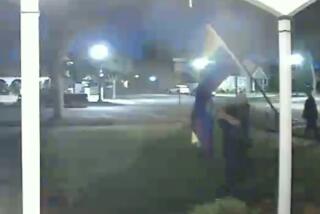Flagging Attention to Etiquette
One of the minor ill effects of the terrorist attacks on the United States last September has been widespread insult to the American flag. I refer not to the ritual burning of the Stars and Stripes in places like Baghdad but to unintentional desecration of it in places like Los Angeles.
On the freeways of Southern California, one observes every day cars and trucks flying the soiled and weather-beaten remnants of American flags raised on Sept. 12 and never lowered since. On one surface street shortcut I often take, I pass a home with a large “God Bless America” sign in the window and, hanging backward from the windowsill, a tattered rag that over the months has gone from red, white and blue to pink, gray and lavender.
I was a lackluster Boy Scout in my day, but one lesson I did learn from my scoutmaster, Mr. Gurney, was how to respect and care for the national emblem. I learned that when the flag is hung in a window, the “union”--that is, the blue field with the white stars--must be to the flag’s right (the viewer’s left) as it faces outward. I learned that unless the flag has a spotlight upon it, it must not be flown at night. An unlighted flag must be lowered at sundown but never be allowed to touch the ground. (At Boy Scout camp, the flag was raised at sunrise--a thrilling duty for the boys chosen each evening without warning to perform it on the following morning.)
It was Mr. Gurney’s view, personal perhaps, but I share it to this day, that the flag ought never be incorporated into a garment like a shirt or a skirt or a hat. The flag may be sewn onto a uniform, but if the colors bleed in the laundry, then one must replace it or remove it. A flag decal must never be affixed to the outside, only to the inside, of a window lest it fade and wrinkle in the weather.
But the lesson that impressed me most deeply--and has come back to me most forcefully as we approach the first Independence Day since Sept. 11--was that to fly the American flag soiled, faded or torn is to insult it. The flag must be kept clean, mended and pressed; and when a given flag is too old for use, it must be retired, cut in pieces and burned with ceremony.
As we approach this Fourth of July, my private hope is that some of my fellow Americans will strike the soiled colors from their vans and sundecks, conduct a proper minor liturgy in their backyards and give the flag merchants of the land of the free and the home of the brave a little fresh business.
More to Read
Sign up for Essential California
The most important California stories and recommendations in your inbox every morning.
You may occasionally receive promotional content from the Los Angeles Times.










